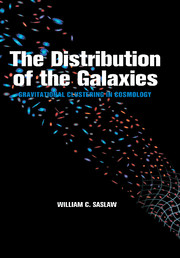Book contents
- Frontmatter
- Contents
- Prologue
- Part I Historical
- 1 Cosmogony Myths and Primitive Notions
- 2 First Qualitative Physics: The Newton–Bentley Exchange
- 3 Glimpses of Structure
- 4 Number Counts and Distributions
- 5 Seeds of Grand Creation
- 6 Clusters versus Correlations
- 7 The Expanding Search for Homogeneity
- Part II Descriptions of Clustering
- Part III Gravity and Correlation Functions
- Part IV Gravity and Distribution Functions
- Part V Computer Experiments for Distribution Functions
- Part VI Observations of Distribution Functions
- Part VII Future Unfoldings
- Bibliography
- Index
2 - First Qualitative Physics: The Newton–Bentley Exchange
Published online by Cambridge University Press: 19 January 2010
- Frontmatter
- Contents
- Prologue
- Part I Historical
- 1 Cosmogony Myths and Primitive Notions
- 2 First Qualitative Physics: The Newton–Bentley Exchange
- 3 Glimpses of Structure
- 4 Number Counts and Distributions
- 5 Seeds of Grand Creation
- 6 Clusters versus Correlations
- 7 The Expanding Search for Homogeneity
- Part II Descriptions of Clustering
- Part III Gravity and Correlation Functions
- Part IV Gravity and Distribution Functions
- Part V Computer Experiments for Distribution Functions
- Part VI Observations of Distribution Functions
- Part VII Future Unfoldings
- Bibliography
- Index
Summary
The aim of argument, or of discussion,
should not be victory, but progress.
Joseph Joubert, PenséesIsaac Newton needs no introduction.
Richard Bentley was one of England's leading theologians, with strong scientific interests and very worldly ambitions. Eventually he became Master of Trinity College, Cambridge, reigning for forty-two contentious years. Tyrannical and over-bearing, Bentley tried to reform the College (as well as the University Press) and spent much of the College's income on new buildings, including a small observatory. To balance the College accounts he reduced its payments to less active Fellows, while increasing his own stipend. After ten years of this, some of the Fellows rebelled and appealed to the Bishop of Ely and Queen Anne, the ultimate College authorities, to eject Bentley from the mastership. Various ruses enabled Bentley to put off the trial for another four years. Finally the Bishop condemned Bentley in a public court. But before he could formally deprive Bentley of his mastership, the Bishop caught a chill and died. Queen Anne died the next day. Bentley now put his theological talents to work to convince his opponents that he had won “victory” by divine intervention. So he retained the mastership and raised his salary still higher.
- Type
- Chapter
- Information
- The Distribution of the GalaxiesGravitational Clustering in Cosmology, pp. 11 - 16Publisher: Cambridge University PressPrint publication year: 1999



